ACCT 20074 Contemporary Accounting Theory Report on Corporate Failures
VerifiedAdded on 2023/01/04
|13
|3462
|2
Report
AI Summary
This report delves into contemporary accounting theory, examining how corporate failures have historically spurred improvements in accounting regulations and financial reporting standards. The analysis reviews relevant literature to illustrate the cyclical relationship between crises, regulatory reforms, and corporate governance. The report also critically evaluates the political dimensions of accounting standard setting, highlighting the pressures faced by standard-setting bodies and their responses. The discussion includes examples of corporate collapses, such as Enron and instances in Australia, and assesses the impact of regulations like SOX. Furthermore, the study explores how political influences, particularly from the European Union, have shaped accounting standards, demonstrating the complex interplay between technical and political factors in the evolution of accounting practices.
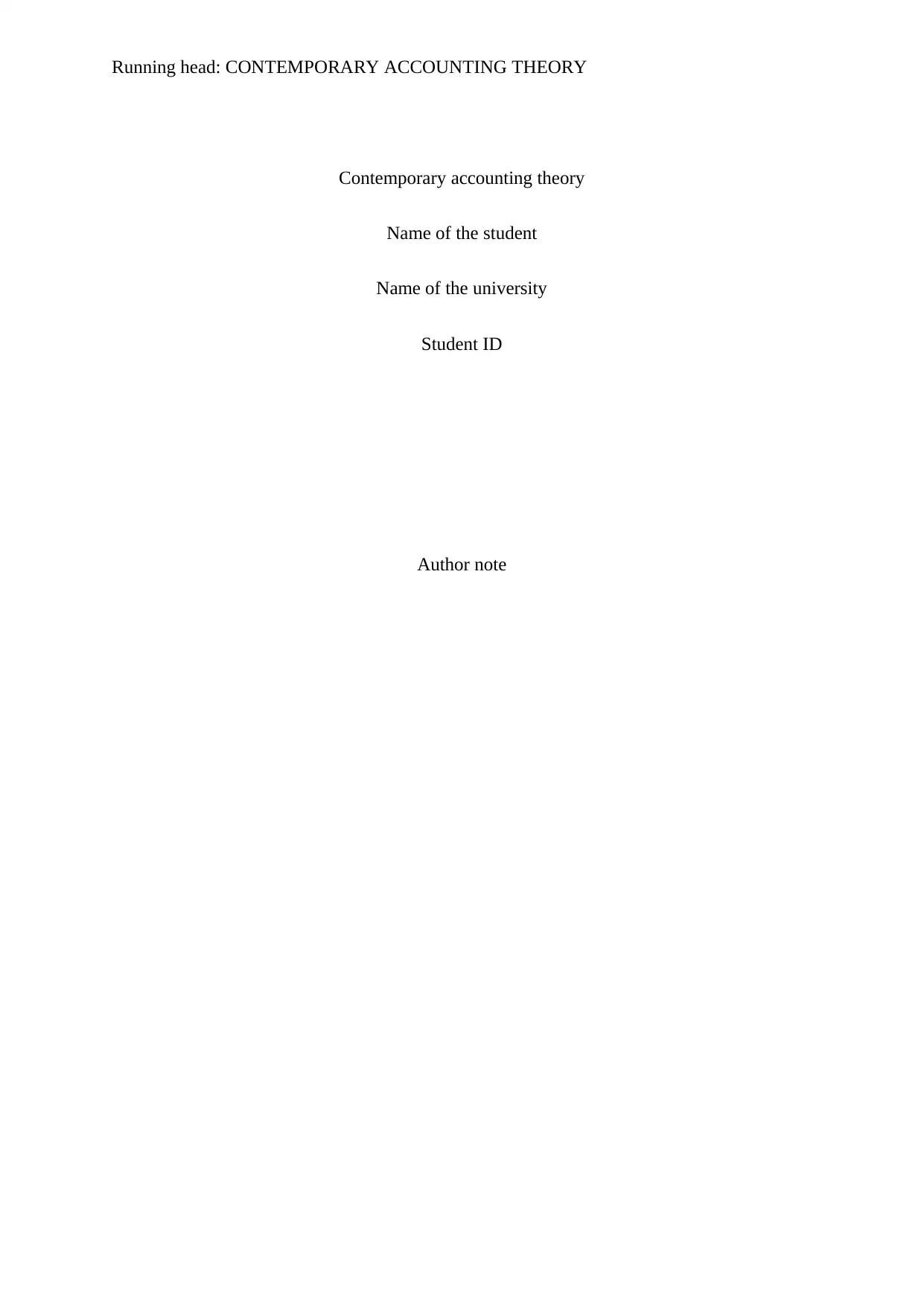
Running head: CONTEMPORARY ACCOUNTING THEORY
Contemporary accounting theory
Name of the student
Name of the university
Student ID
Author note
Contemporary accounting theory
Name of the student
Name of the university
Student ID
Author note
Paraphrase This Document
Need a fresh take? Get an instant paraphrase of this document with our AI Paraphraser
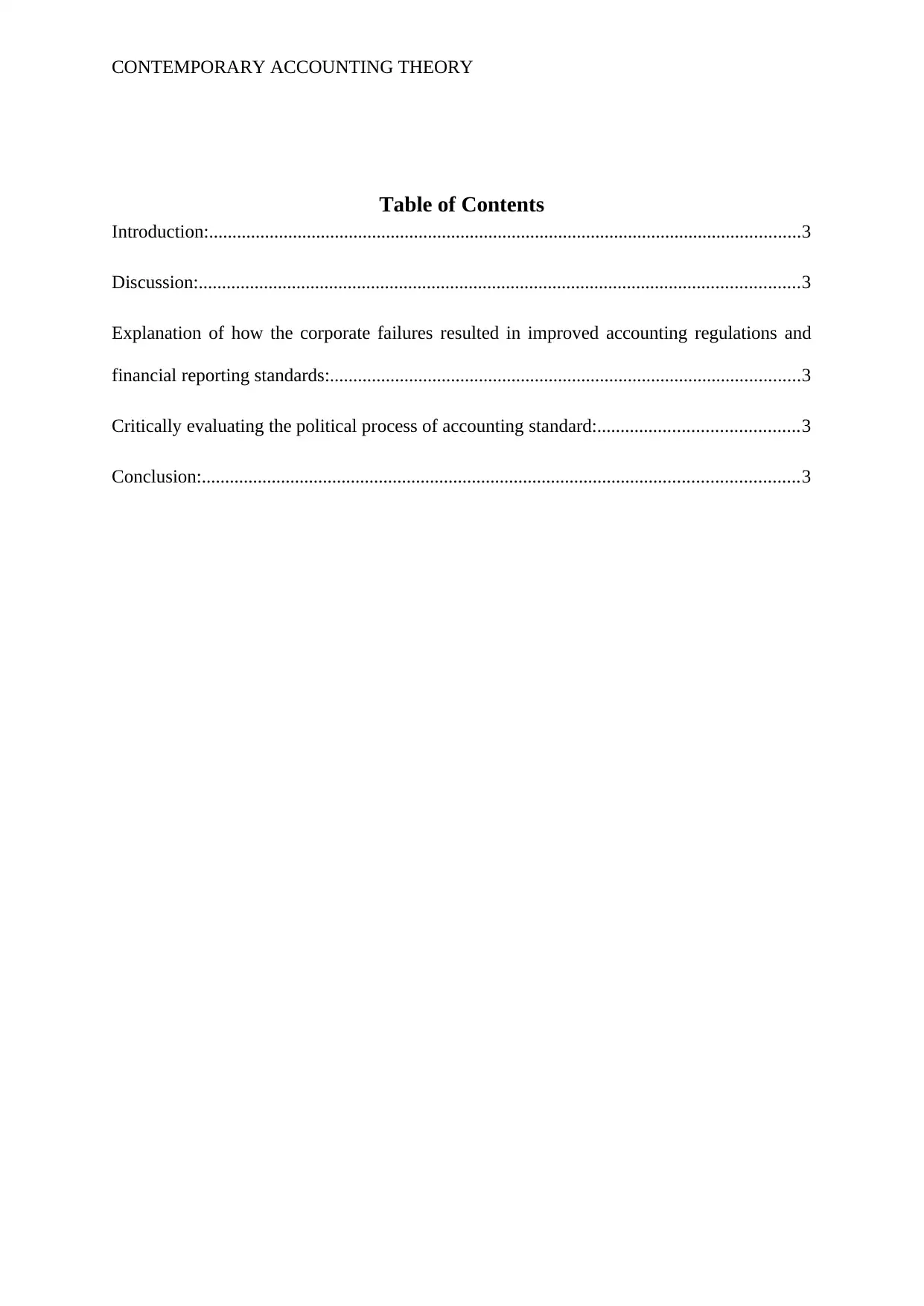
CONTEMPORARY ACCOUNTING THEORY
Table of Contents
Introduction:...............................................................................................................................3
Discussion:.................................................................................................................................3
Explanation of how the corporate failures resulted in improved accounting regulations and
financial reporting standards:.....................................................................................................3
Critically evaluating the political process of accounting standard:...........................................3
Conclusion:................................................................................................................................3
Table of Contents
Introduction:...............................................................................................................................3
Discussion:.................................................................................................................................3
Explanation of how the corporate failures resulted in improved accounting regulations and
financial reporting standards:.....................................................................................................3
Critically evaluating the political process of accounting standard:...........................................3
Conclusion:................................................................................................................................3
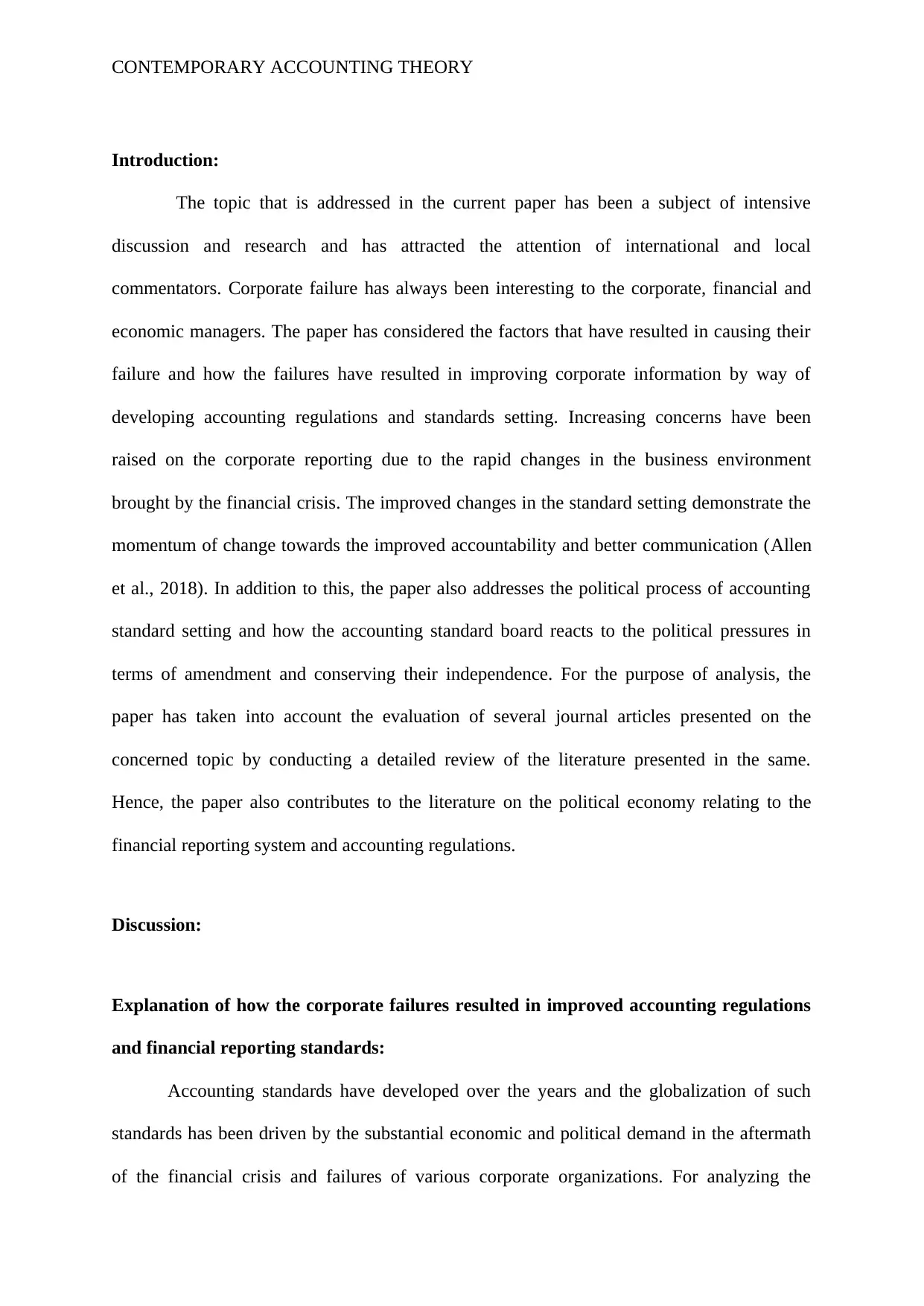
CONTEMPORARY ACCOUNTING THEORY
Introduction:
The topic that is addressed in the current paper has been a subject of intensive
discussion and research and has attracted the attention of international and local
commentators. Corporate failure has always been interesting to the corporate, financial and
economic managers. The paper has considered the factors that have resulted in causing their
failure and how the failures have resulted in improving corporate information by way of
developing accounting regulations and standards setting. Increasing concerns have been
raised on the corporate reporting due to the rapid changes in the business environment
brought by the financial crisis. The improved changes in the standard setting demonstrate the
momentum of change towards the improved accountability and better communication (Allen
et al., 2018). In addition to this, the paper also addresses the political process of accounting
standard setting and how the accounting standard board reacts to the political pressures in
terms of amendment and conserving their independence. For the purpose of analysis, the
paper has taken into account the evaluation of several journal articles presented on the
concerned topic by conducting a detailed review of the literature presented in the same.
Hence, the paper also contributes to the literature on the political economy relating to the
financial reporting system and accounting regulations.
Discussion:
Explanation of how the corporate failures resulted in improved accounting regulations
and financial reporting standards:
Accounting standards have developed over the years and the globalization of such
standards has been driven by the substantial economic and political demand in the aftermath
of the financial crisis and failures of various corporate organizations. For analyzing the
Introduction:
The topic that is addressed in the current paper has been a subject of intensive
discussion and research and has attracted the attention of international and local
commentators. Corporate failure has always been interesting to the corporate, financial and
economic managers. The paper has considered the factors that have resulted in causing their
failure and how the failures have resulted in improving corporate information by way of
developing accounting regulations and standards setting. Increasing concerns have been
raised on the corporate reporting due to the rapid changes in the business environment
brought by the financial crisis. The improved changes in the standard setting demonstrate the
momentum of change towards the improved accountability and better communication (Allen
et al., 2018). In addition to this, the paper also addresses the political process of accounting
standard setting and how the accounting standard board reacts to the political pressures in
terms of amendment and conserving their independence. For the purpose of analysis, the
paper has taken into account the evaluation of several journal articles presented on the
concerned topic by conducting a detailed review of the literature presented in the same.
Hence, the paper also contributes to the literature on the political economy relating to the
financial reporting system and accounting regulations.
Discussion:
Explanation of how the corporate failures resulted in improved accounting regulations
and financial reporting standards:
Accounting standards have developed over the years and the globalization of such
standards has been driven by the substantial economic and political demand in the aftermath
of the financial crisis and failures of various corporate organizations. For analyzing the
⊘ This is a preview!⊘
Do you want full access?
Subscribe today to unlock all pages.

Trusted by 1+ million students worldwide
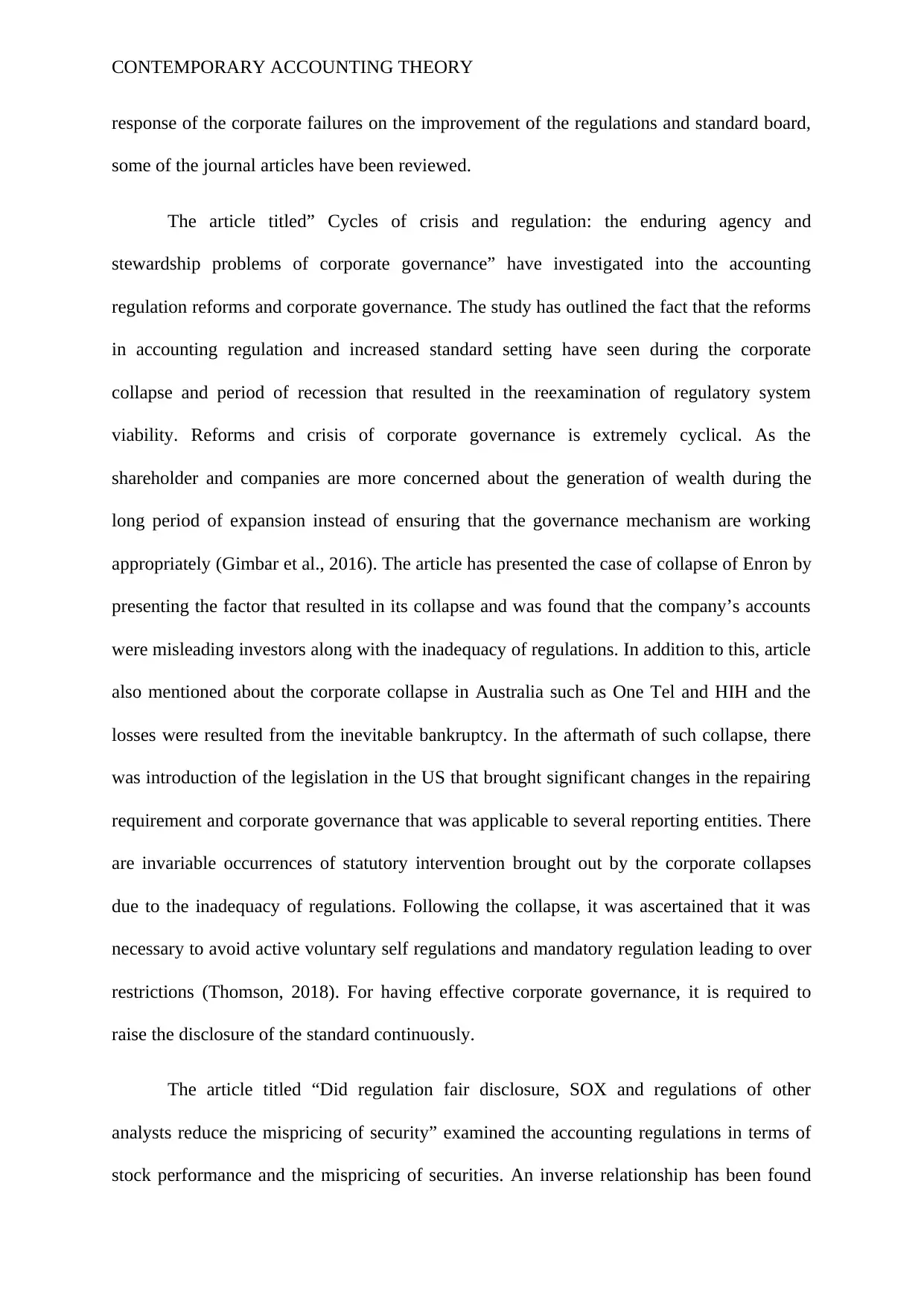
CONTEMPORARY ACCOUNTING THEORY
response of the corporate failures on the improvement of the regulations and standard board,
some of the journal articles have been reviewed.
The article titled” Cycles of crisis and regulation: the enduring agency and
stewardship problems of corporate governance” have investigated into the accounting
regulation reforms and corporate governance. The study has outlined the fact that the reforms
in accounting regulation and increased standard setting have seen during the corporate
collapse and period of recession that resulted in the reexamination of regulatory system
viability. Reforms and crisis of corporate governance is extremely cyclical. As the
shareholder and companies are more concerned about the generation of wealth during the
long period of expansion instead of ensuring that the governance mechanism are working
appropriately (Gimbar et al., 2016). The article has presented the case of collapse of Enron by
presenting the factor that resulted in its collapse and was found that the company’s accounts
were misleading investors along with the inadequacy of regulations. In addition to this, article
also mentioned about the corporate collapse in Australia such as One Tel and HIH and the
losses were resulted from the inevitable bankruptcy. In the aftermath of such collapse, there
was introduction of the legislation in the US that brought significant changes in the repairing
requirement and corporate governance that was applicable to several reporting entities. There
are invariable occurrences of statutory intervention brought out by the corporate collapses
due to the inadequacy of regulations. Following the collapse, it was ascertained that it was
necessary to avoid active voluntary self regulations and mandatory regulation leading to over
restrictions (Thomson, 2018). For having effective corporate governance, it is required to
raise the disclosure of the standard continuously.
The article titled “Did regulation fair disclosure, SOX and regulations of other
analysts reduce the mispricing of security” examined the accounting regulations in terms of
stock performance and the mispricing of securities. An inverse relationship has been found
response of the corporate failures on the improvement of the regulations and standard board,
some of the journal articles have been reviewed.
The article titled” Cycles of crisis and regulation: the enduring agency and
stewardship problems of corporate governance” have investigated into the accounting
regulation reforms and corporate governance. The study has outlined the fact that the reforms
in accounting regulation and increased standard setting have seen during the corporate
collapse and period of recession that resulted in the reexamination of regulatory system
viability. Reforms and crisis of corporate governance is extremely cyclical. As the
shareholder and companies are more concerned about the generation of wealth during the
long period of expansion instead of ensuring that the governance mechanism are working
appropriately (Gimbar et al., 2016). The article has presented the case of collapse of Enron by
presenting the factor that resulted in its collapse and was found that the company’s accounts
were misleading investors along with the inadequacy of regulations. In addition to this, article
also mentioned about the corporate collapse in Australia such as One Tel and HIH and the
losses were resulted from the inevitable bankruptcy. In the aftermath of such collapse, there
was introduction of the legislation in the US that brought significant changes in the repairing
requirement and corporate governance that was applicable to several reporting entities. There
are invariable occurrences of statutory intervention brought out by the corporate collapses
due to the inadequacy of regulations. Following the collapse, it was ascertained that it was
necessary to avoid active voluntary self regulations and mandatory regulation leading to over
restrictions (Thomson, 2018). For having effective corporate governance, it is required to
raise the disclosure of the standard continuously.
The article titled “Did regulation fair disclosure, SOX and regulations of other
analysts reduce the mispricing of security” examined the accounting regulations in terms of
stock performance and the mispricing of securities. An inverse relationship has been found
Paraphrase This Document
Need a fresh take? Get an instant paraphrase of this document with our AI Paraphraser
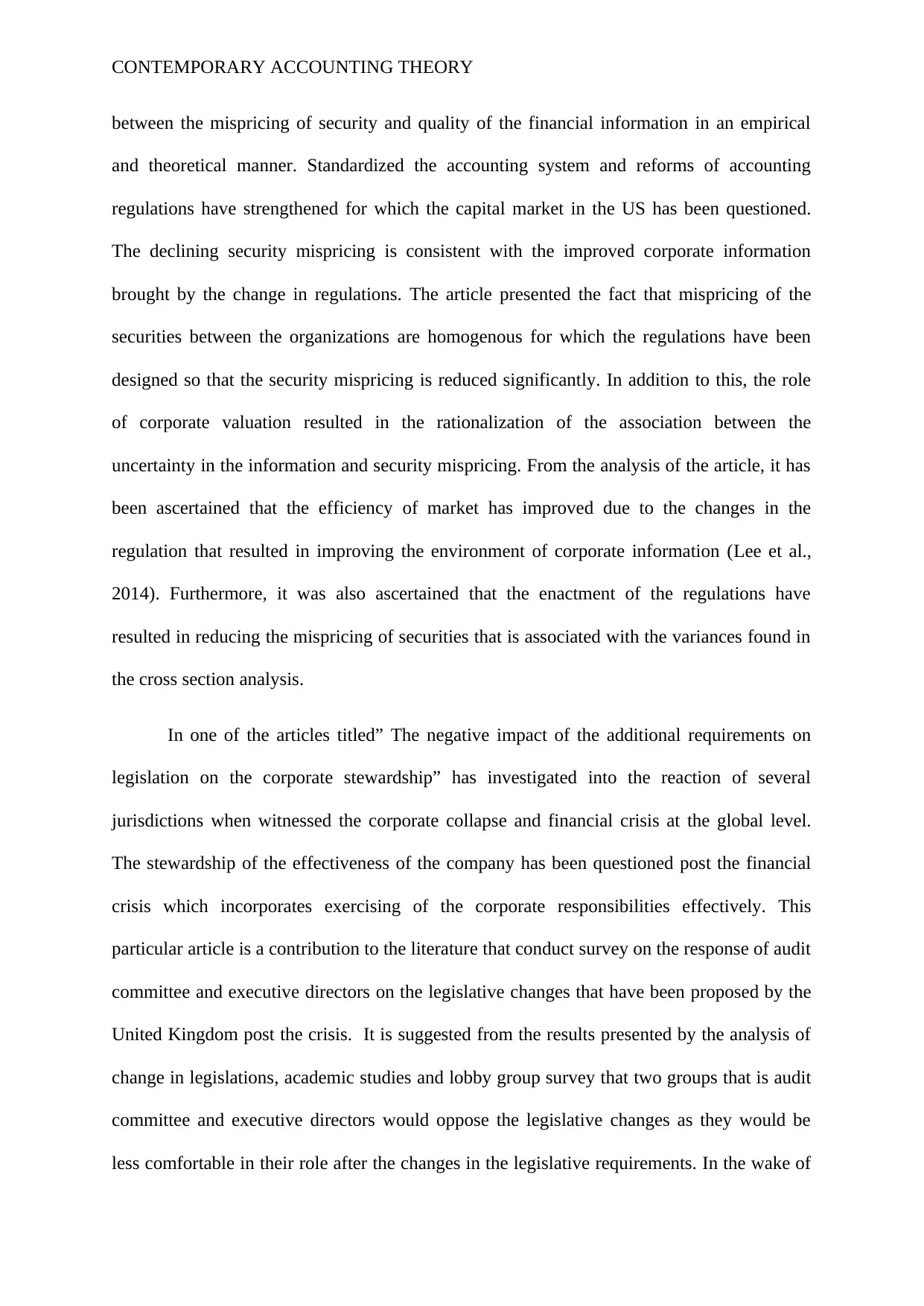
CONTEMPORARY ACCOUNTING THEORY
between the mispricing of security and quality of the financial information in an empirical
and theoretical manner. Standardized the accounting system and reforms of accounting
regulations have strengthened for which the capital market in the US has been questioned.
The declining security mispricing is consistent with the improved corporate information
brought by the change in regulations. The article presented the fact that mispricing of the
securities between the organizations are homogenous for which the regulations have been
designed so that the security mispricing is reduced significantly. In addition to this, the role
of corporate valuation resulted in the rationalization of the association between the
uncertainty in the information and security mispricing. From the analysis of the article, it has
been ascertained that the efficiency of market has improved due to the changes in the
regulation that resulted in improving the environment of corporate information (Lee et al.,
2014). Furthermore, it was also ascertained that the enactment of the regulations have
resulted in reducing the mispricing of securities that is associated with the variances found in
the cross section analysis.
In one of the articles titled” The negative impact of the additional requirements on
legislation on the corporate stewardship” has investigated into the reaction of several
jurisdictions when witnessed the corporate collapse and financial crisis at the global level.
The stewardship of the effectiveness of the company has been questioned post the financial
crisis which incorporates exercising of the corporate responsibilities effectively. This
particular article is a contribution to the literature that conduct survey on the response of audit
committee and executive directors on the legislative changes that have been proposed by the
United Kingdom post the crisis. It is suggested from the results presented by the analysis of
change in legislations, academic studies and lobby group survey that two groups that is audit
committee and executive directors would oppose the legislative changes as they would be
less comfortable in their role after the changes in the legislative requirements. In the wake of
between the mispricing of security and quality of the financial information in an empirical
and theoretical manner. Standardized the accounting system and reforms of accounting
regulations have strengthened for which the capital market in the US has been questioned.
The declining security mispricing is consistent with the improved corporate information
brought by the change in regulations. The article presented the fact that mispricing of the
securities between the organizations are homogenous for which the regulations have been
designed so that the security mispricing is reduced significantly. In addition to this, the role
of corporate valuation resulted in the rationalization of the association between the
uncertainty in the information and security mispricing. From the analysis of the article, it has
been ascertained that the efficiency of market has improved due to the changes in the
regulation that resulted in improving the environment of corporate information (Lee et al.,
2014). Furthermore, it was also ascertained that the enactment of the regulations have
resulted in reducing the mispricing of securities that is associated with the variances found in
the cross section analysis.
In one of the articles titled” The negative impact of the additional requirements on
legislation on the corporate stewardship” has investigated into the reaction of several
jurisdictions when witnessed the corporate collapse and financial crisis at the global level.
The stewardship of the effectiveness of the company has been questioned post the financial
crisis which incorporates exercising of the corporate responsibilities effectively. This
particular article is a contribution to the literature that conduct survey on the response of audit
committee and executive directors on the legislative changes that have been proposed by the
United Kingdom post the crisis. It is suggested from the results presented by the analysis of
change in legislations, academic studies and lobby group survey that two groups that is audit
committee and executive directors would oppose the legislative changes as they would be
less comfortable in their role after the changes in the legislative requirements. In the wake of
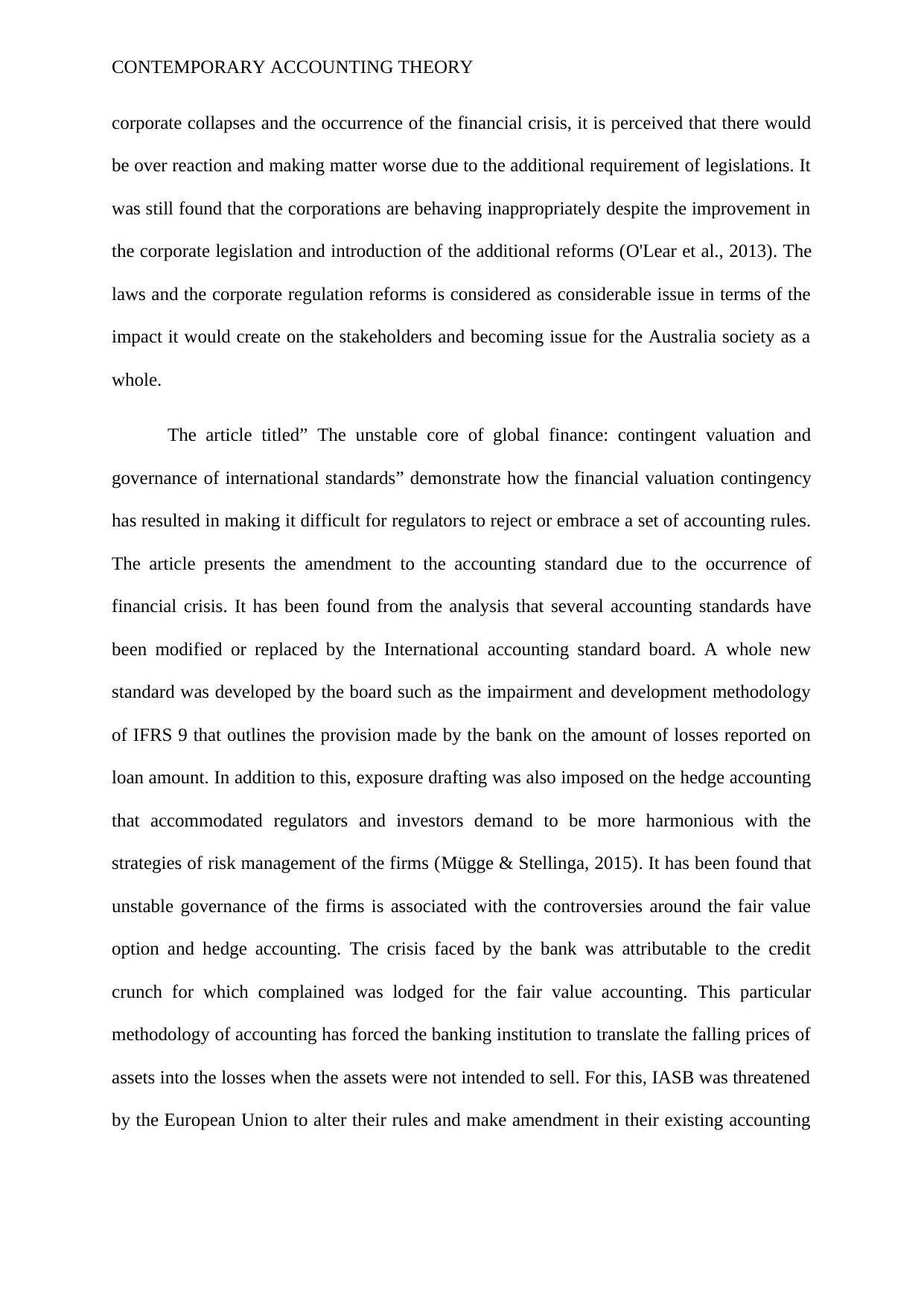
CONTEMPORARY ACCOUNTING THEORY
corporate collapses and the occurrence of the financial crisis, it is perceived that there would
be over reaction and making matter worse due to the additional requirement of legislations. It
was still found that the corporations are behaving inappropriately despite the improvement in
the corporate legislation and introduction of the additional reforms (O'Lear et al., 2013). The
laws and the corporate regulation reforms is considered as considerable issue in terms of the
impact it would create on the stakeholders and becoming issue for the Australia society as a
whole.
The article titled” The unstable core of global finance: contingent valuation and
governance of international standards” demonstrate how the financial valuation contingency
has resulted in making it difficult for regulators to reject or embrace a set of accounting rules.
The article presents the amendment to the accounting standard due to the occurrence of
financial crisis. It has been found from the analysis that several accounting standards have
been modified or replaced by the International accounting standard board. A whole new
standard was developed by the board such as the impairment and development methodology
of IFRS 9 that outlines the provision made by the bank on the amount of losses reported on
loan amount. In addition to this, exposure drafting was also imposed on the hedge accounting
that accommodated regulators and investors demand to be more harmonious with the
strategies of risk management of the firms (Mügge & Stellinga, 2015). It has been found that
unstable governance of the firms is associated with the controversies around the fair value
option and hedge accounting. The crisis faced by the bank was attributable to the credit
crunch for which complained was lodged for the fair value accounting. This particular
methodology of accounting has forced the banking institution to translate the falling prices of
assets into the losses when the assets were not intended to sell. For this, IASB was threatened
by the European Union to alter their rules and make amendment in their existing accounting
corporate collapses and the occurrence of the financial crisis, it is perceived that there would
be over reaction and making matter worse due to the additional requirement of legislations. It
was still found that the corporations are behaving inappropriately despite the improvement in
the corporate legislation and introduction of the additional reforms (O'Lear et al., 2013). The
laws and the corporate regulation reforms is considered as considerable issue in terms of the
impact it would create on the stakeholders and becoming issue for the Australia society as a
whole.
The article titled” The unstable core of global finance: contingent valuation and
governance of international standards” demonstrate how the financial valuation contingency
has resulted in making it difficult for regulators to reject or embrace a set of accounting rules.
The article presents the amendment to the accounting standard due to the occurrence of
financial crisis. It has been found from the analysis that several accounting standards have
been modified or replaced by the International accounting standard board. A whole new
standard was developed by the board such as the impairment and development methodology
of IFRS 9 that outlines the provision made by the bank on the amount of losses reported on
loan amount. In addition to this, exposure drafting was also imposed on the hedge accounting
that accommodated regulators and investors demand to be more harmonious with the
strategies of risk management of the firms (Mügge & Stellinga, 2015). It has been found that
unstable governance of the firms is associated with the controversies around the fair value
option and hedge accounting. The crisis faced by the bank was attributable to the credit
crunch for which complained was lodged for the fair value accounting. This particular
methodology of accounting has forced the banking institution to translate the falling prices of
assets into the losses when the assets were not intended to sell. For this, IASB was threatened
by the European Union to alter their rules and make amendment in their existing accounting
⊘ This is a preview!⊘
Do you want full access?
Subscribe today to unlock all pages.

Trusted by 1+ million students worldwide
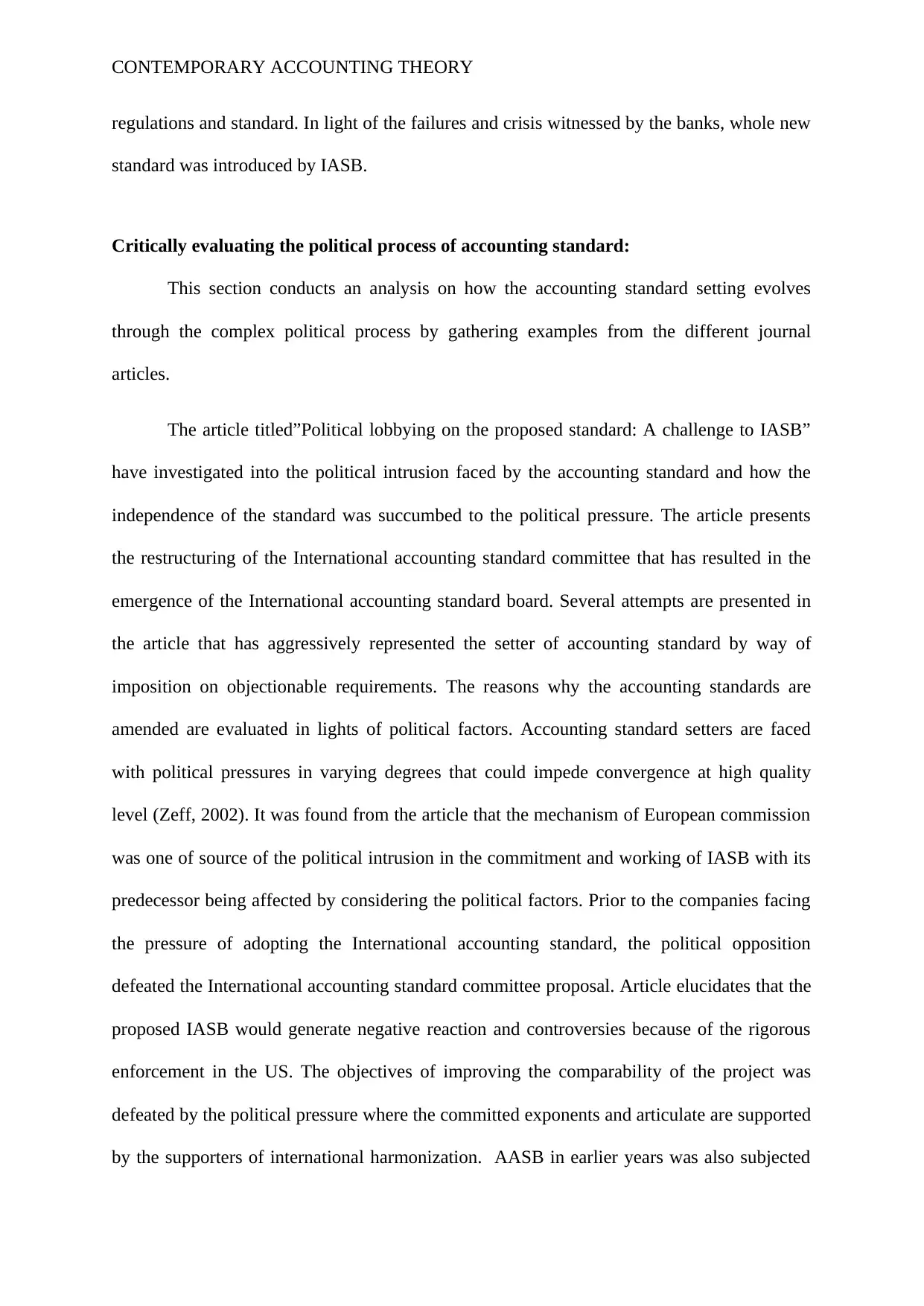
CONTEMPORARY ACCOUNTING THEORY
regulations and standard. In light of the failures and crisis witnessed by the banks, whole new
standard was introduced by IASB.
Critically evaluating the political process of accounting standard:
This section conducts an analysis on how the accounting standard setting evolves
through the complex political process by gathering examples from the different journal
articles.
The article titled”Political lobbying on the proposed standard: A challenge to IASB”
have investigated into the political intrusion faced by the accounting standard and how the
independence of the standard was succumbed to the political pressure. The article presents
the restructuring of the International accounting standard committee that has resulted in the
emergence of the International accounting standard board. Several attempts are presented in
the article that has aggressively represented the setter of accounting standard by way of
imposition on objectionable requirements. The reasons why the accounting standards are
amended are evaluated in lights of political factors. Accounting standard setters are faced
with political pressures in varying degrees that could impede convergence at high quality
level (Zeff, 2002). It was found from the article that the mechanism of European commission
was one of source of the political intrusion in the commitment and working of IASB with its
predecessor being affected by considering the political factors. Prior to the companies facing
the pressure of adopting the International accounting standard, the political opposition
defeated the International accounting standard committee proposal. Article elucidates that the
proposed IASB would generate negative reaction and controversies because of the rigorous
enforcement in the US. The objectives of improving the comparability of the project was
defeated by the political pressure where the committed exponents and articulate are supported
by the supporters of international harmonization. AASB in earlier years was also subjected
regulations and standard. In light of the failures and crisis witnessed by the banks, whole new
standard was introduced by IASB.
Critically evaluating the political process of accounting standard:
This section conducts an analysis on how the accounting standard setting evolves
through the complex political process by gathering examples from the different journal
articles.
The article titled”Political lobbying on the proposed standard: A challenge to IASB”
have investigated into the political intrusion faced by the accounting standard and how the
independence of the standard was succumbed to the political pressure. The article presents
the restructuring of the International accounting standard committee that has resulted in the
emergence of the International accounting standard board. Several attempts are presented in
the article that has aggressively represented the setter of accounting standard by way of
imposition on objectionable requirements. The reasons why the accounting standards are
amended are evaluated in lights of political factors. Accounting standard setters are faced
with political pressures in varying degrees that could impede convergence at high quality
level (Zeff, 2002). It was found from the article that the mechanism of European commission
was one of source of the political intrusion in the commitment and working of IASB with its
predecessor being affected by considering the political factors. Prior to the companies facing
the pressure of adopting the International accounting standard, the political opposition
defeated the International accounting standard committee proposal. Article elucidates that the
proposed IASB would generate negative reaction and controversies because of the rigorous
enforcement in the US. The objectives of improving the comparability of the project was
defeated by the political pressure where the committed exponents and articulate are supported
by the supporters of international harmonization. AASB in earlier years was also subjected
Paraphrase This Document
Need a fresh take? Get an instant paraphrase of this document with our AI Paraphraser
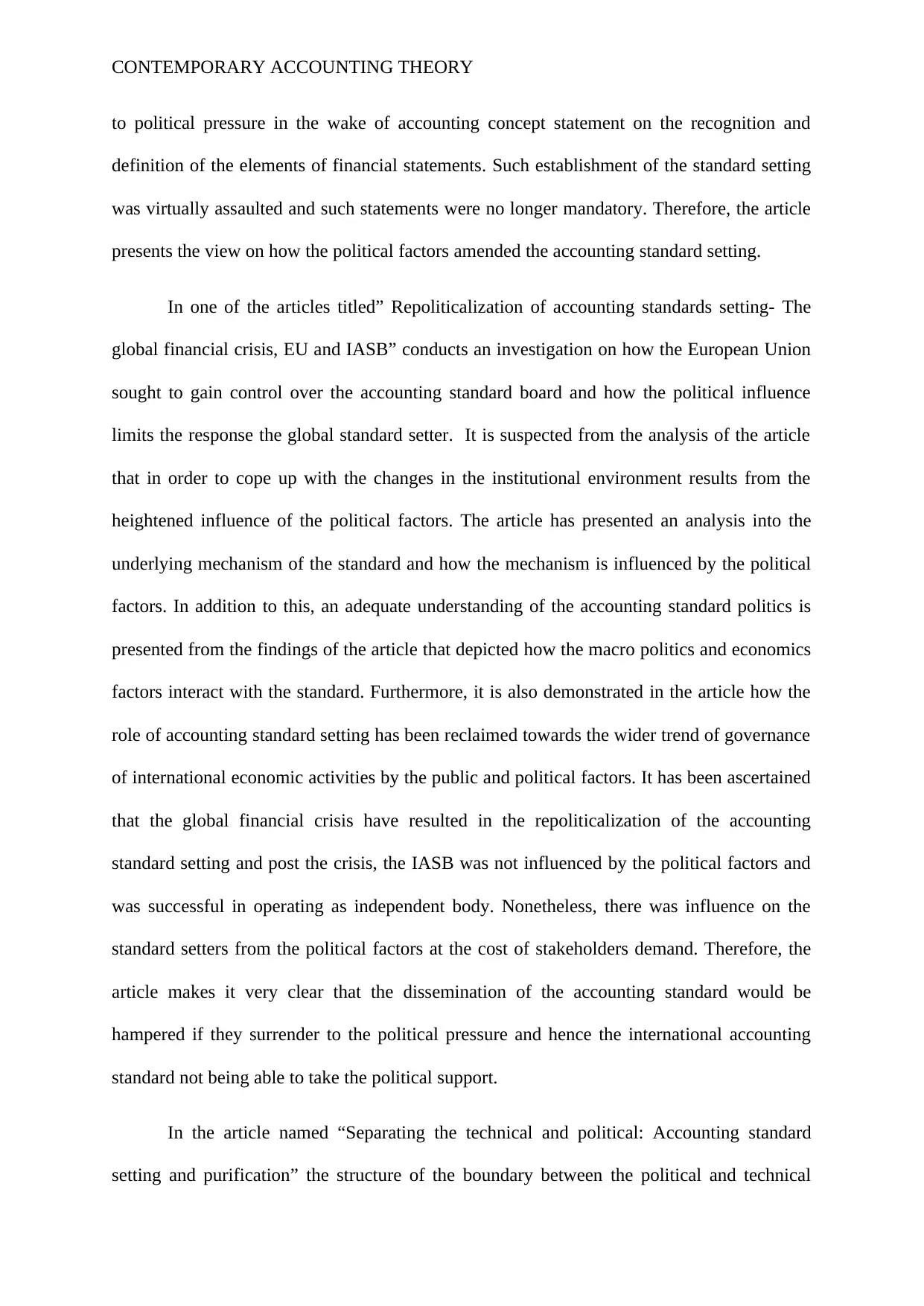
CONTEMPORARY ACCOUNTING THEORY
to political pressure in the wake of accounting concept statement on the recognition and
definition of the elements of financial statements. Such establishment of the standard setting
was virtually assaulted and such statements were no longer mandatory. Therefore, the article
presents the view on how the political factors amended the accounting standard setting.
In one of the articles titled” Repoliticalization of accounting standards setting- The
global financial crisis, EU and IASB” conducts an investigation on how the European Union
sought to gain control over the accounting standard board and how the political influence
limits the response the global standard setter. It is suspected from the analysis of the article
that in order to cope up with the changes in the institutional environment results from the
heightened influence of the political factors. The article has presented an analysis into the
underlying mechanism of the standard and how the mechanism is influenced by the political
factors. In addition to this, an adequate understanding of the accounting standard politics is
presented from the findings of the article that depicted how the macro politics and economics
factors interact with the standard. Furthermore, it is also demonstrated in the article how the
role of accounting standard setting has been reclaimed towards the wider trend of governance
of international economic activities by the public and political factors. It has been ascertained
that the global financial crisis have resulted in the repoliticalization of the accounting
standard setting and post the crisis, the IASB was not influenced by the political factors and
was successful in operating as independent body. Nonetheless, there was influence on the
standard setters from the political factors at the cost of stakeholders demand. Therefore, the
article makes it very clear that the dissemination of the accounting standard would be
hampered if they surrender to the political pressure and hence the international accounting
standard not being able to take the political support.
In the article named “Separating the technical and political: Accounting standard
setting and purification” the structure of the boundary between the political and technical
to political pressure in the wake of accounting concept statement on the recognition and
definition of the elements of financial statements. Such establishment of the standard setting
was virtually assaulted and such statements were no longer mandatory. Therefore, the article
presents the view on how the political factors amended the accounting standard setting.
In one of the articles titled” Repoliticalization of accounting standards setting- The
global financial crisis, EU and IASB” conducts an investigation on how the European Union
sought to gain control over the accounting standard board and how the political influence
limits the response the global standard setter. It is suspected from the analysis of the article
that in order to cope up with the changes in the institutional environment results from the
heightened influence of the political factors. The article has presented an analysis into the
underlying mechanism of the standard and how the mechanism is influenced by the political
factors. In addition to this, an adequate understanding of the accounting standard politics is
presented from the findings of the article that depicted how the macro politics and economics
factors interact with the standard. Furthermore, it is also demonstrated in the article how the
role of accounting standard setting has been reclaimed towards the wider trend of governance
of international economic activities by the public and political factors. It has been ascertained
that the global financial crisis have resulted in the repoliticalization of the accounting
standard setting and post the crisis, the IASB was not influenced by the political factors and
was successful in operating as independent body. Nonetheless, there was influence on the
standard setters from the political factors at the cost of stakeholders demand. Therefore, the
article makes it very clear that the dissemination of the accounting standard would be
hampered if they surrender to the political pressure and hence the international accounting
standard not being able to take the political support.
In the article named “Separating the technical and political: Accounting standard
setting and purification” the structure of the boundary between the political and technical
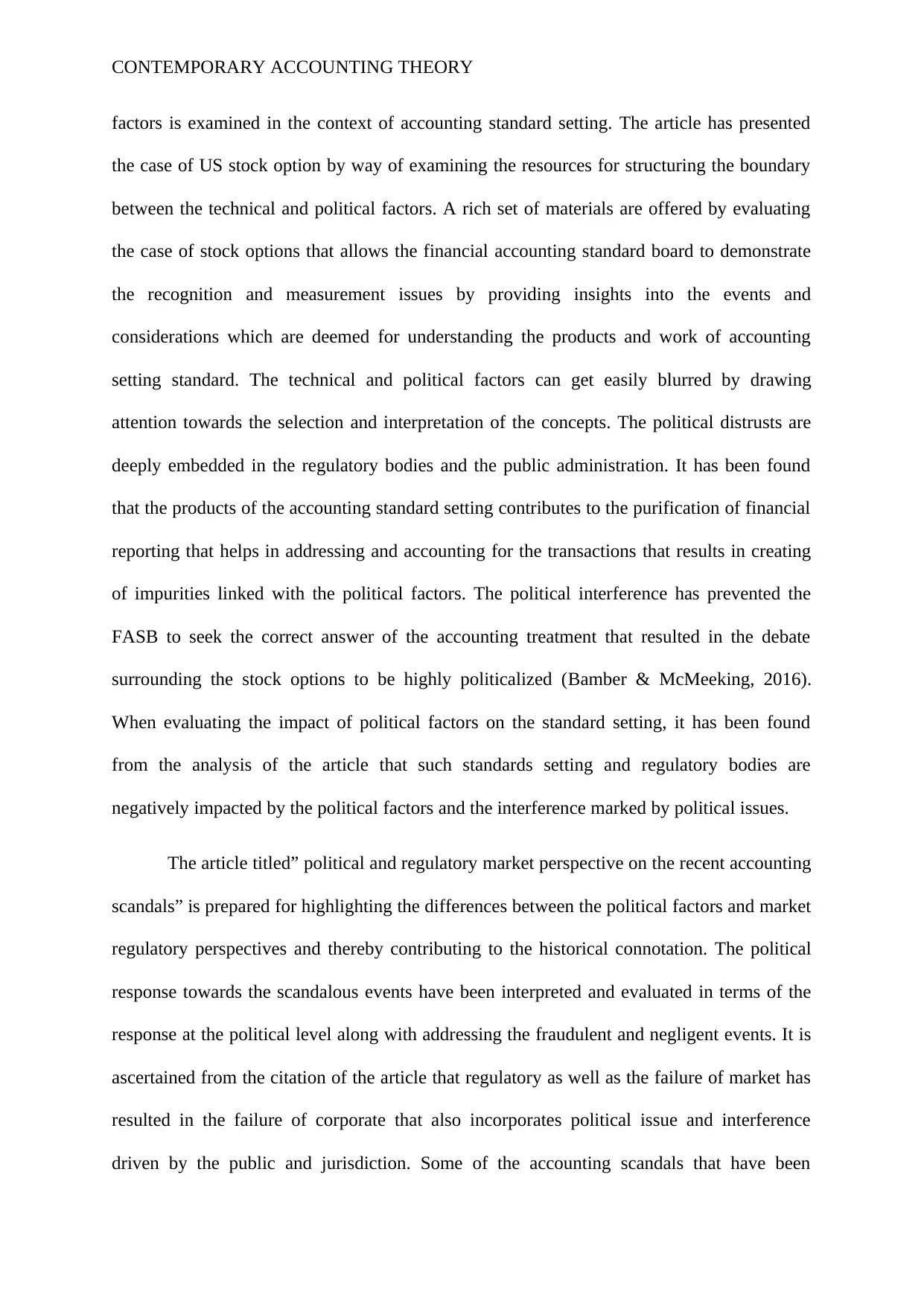
CONTEMPORARY ACCOUNTING THEORY
factors is examined in the context of accounting standard setting. The article has presented
the case of US stock option by way of examining the resources for structuring the boundary
between the technical and political factors. A rich set of materials are offered by evaluating
the case of stock options that allows the financial accounting standard board to demonstrate
the recognition and measurement issues by providing insights into the events and
considerations which are deemed for understanding the products and work of accounting
setting standard. The technical and political factors can get easily blurred by drawing
attention towards the selection and interpretation of the concepts. The political distrusts are
deeply embedded in the regulatory bodies and the public administration. It has been found
that the products of the accounting standard setting contributes to the purification of financial
reporting that helps in addressing and accounting for the transactions that results in creating
of impurities linked with the political factors. The political interference has prevented the
FASB to seek the correct answer of the accounting treatment that resulted in the debate
surrounding the stock options to be highly politicalized (Bamber & McMeeking, 2016).
When evaluating the impact of political factors on the standard setting, it has been found
from the analysis of the article that such standards setting and regulatory bodies are
negatively impacted by the political factors and the interference marked by political issues.
The article titled” political and regulatory market perspective on the recent accounting
scandals” is prepared for highlighting the differences between the political factors and market
regulatory perspectives and thereby contributing to the historical connotation. The political
response towards the scandalous events have been interpreted and evaluated in terms of the
response at the political level along with addressing the fraudulent and negligent events. It is
ascertained from the citation of the article that regulatory as well as the failure of market has
resulted in the failure of corporate that also incorporates political issue and interference
driven by the public and jurisdiction. Some of the accounting scandals that have been
factors is examined in the context of accounting standard setting. The article has presented
the case of US stock option by way of examining the resources for structuring the boundary
between the technical and political factors. A rich set of materials are offered by evaluating
the case of stock options that allows the financial accounting standard board to demonstrate
the recognition and measurement issues by providing insights into the events and
considerations which are deemed for understanding the products and work of accounting
setting standard. The technical and political factors can get easily blurred by drawing
attention towards the selection and interpretation of the concepts. The political distrusts are
deeply embedded in the regulatory bodies and the public administration. It has been found
that the products of the accounting standard setting contributes to the purification of financial
reporting that helps in addressing and accounting for the transactions that results in creating
of impurities linked with the political factors. The political interference has prevented the
FASB to seek the correct answer of the accounting treatment that resulted in the debate
surrounding the stock options to be highly politicalized (Bamber & McMeeking, 2016).
When evaluating the impact of political factors on the standard setting, it has been found
from the analysis of the article that such standards setting and regulatory bodies are
negatively impacted by the political factors and the interference marked by political issues.
The article titled” political and regulatory market perspective on the recent accounting
scandals” is prepared for highlighting the differences between the political factors and market
regulatory perspectives and thereby contributing to the historical connotation. The political
response towards the scandalous events have been interpreted and evaluated in terms of the
response at the political level along with addressing the fraudulent and negligent events. It is
ascertained from the citation of the article that regulatory as well as the failure of market has
resulted in the failure of corporate that also incorporates political issue and interference
driven by the public and jurisdiction. Some of the accounting scandals that have been
⊘ This is a preview!⊘
Do you want full access?
Subscribe today to unlock all pages.

Trusted by 1+ million students worldwide
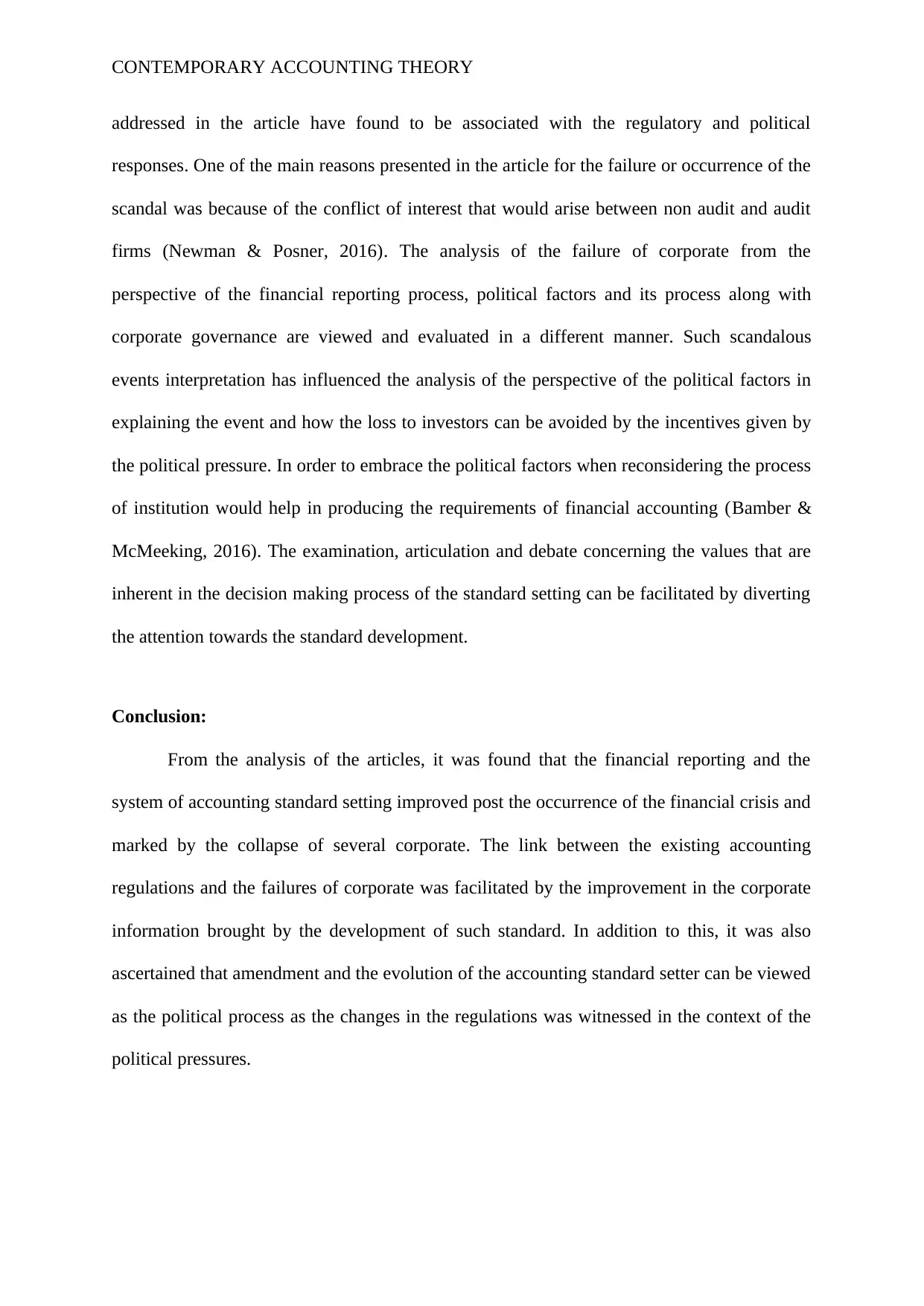
CONTEMPORARY ACCOUNTING THEORY
addressed in the article have found to be associated with the regulatory and political
responses. One of the main reasons presented in the article for the failure or occurrence of the
scandal was because of the conflict of interest that would arise between non audit and audit
firms (Newman & Posner, 2016). The analysis of the failure of corporate from the
perspective of the financial reporting process, political factors and its process along with
corporate governance are viewed and evaluated in a different manner. Such scandalous
events interpretation has influenced the analysis of the perspective of the political factors in
explaining the event and how the loss to investors can be avoided by the incentives given by
the political pressure. In order to embrace the political factors when reconsidering the process
of institution would help in producing the requirements of financial accounting (Bamber &
McMeeking, 2016). The examination, articulation and debate concerning the values that are
inherent in the decision making process of the standard setting can be facilitated by diverting
the attention towards the standard development.
Conclusion:
From the analysis of the articles, it was found that the financial reporting and the
system of accounting standard setting improved post the occurrence of the financial crisis and
marked by the collapse of several corporate. The link between the existing accounting
regulations and the failures of corporate was facilitated by the improvement in the corporate
information brought by the development of such standard. In addition to this, it was also
ascertained that amendment and the evolution of the accounting standard setter can be viewed
as the political process as the changes in the regulations was witnessed in the context of the
political pressures.
addressed in the article have found to be associated with the regulatory and political
responses. One of the main reasons presented in the article for the failure or occurrence of the
scandal was because of the conflict of interest that would arise between non audit and audit
firms (Newman & Posner, 2016). The analysis of the failure of corporate from the
perspective of the financial reporting process, political factors and its process along with
corporate governance are viewed and evaluated in a different manner. Such scandalous
events interpretation has influenced the analysis of the perspective of the political factors in
explaining the event and how the loss to investors can be avoided by the incentives given by
the political pressure. In order to embrace the political factors when reconsidering the process
of institution would help in producing the requirements of financial accounting (Bamber &
McMeeking, 2016). The examination, articulation and debate concerning the values that are
inherent in the decision making process of the standard setting can be facilitated by diverting
the attention towards the standard development.
Conclusion:
From the analysis of the articles, it was found that the financial reporting and the
system of accounting standard setting improved post the occurrence of the financial crisis and
marked by the collapse of several corporate. The link between the existing accounting
regulations and the failures of corporate was facilitated by the improvement in the corporate
information brought by the development of such standard. In addition to this, it was also
ascertained that amendment and the evolution of the accounting standard setter can be viewed
as the political process as the changes in the regulations was witnessed in the context of the
political pressures.
Paraphrase This Document
Need a fresh take? Get an instant paraphrase of this document with our AI Paraphraser
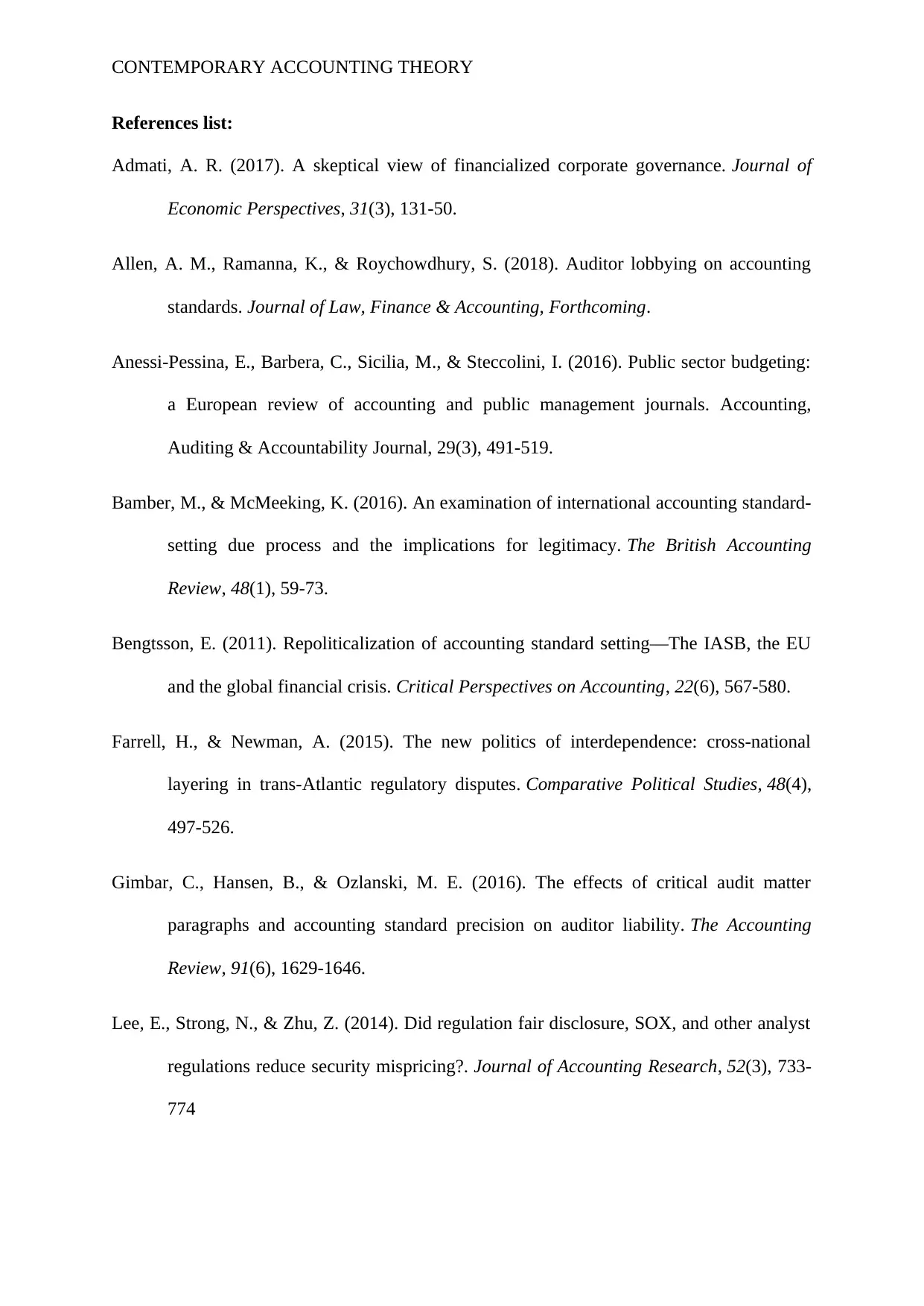
CONTEMPORARY ACCOUNTING THEORY
References list:
Admati, A. R. (2017). A skeptical view of financialized corporate governance. Journal of
Economic Perspectives, 31(3), 131-50.
Allen, A. M., Ramanna, K., & Roychowdhury, S. (2018). Auditor lobbying on accounting
standards. Journal of Law, Finance & Accounting, Forthcoming.
Anessi-Pessina, E., Barbera, C., Sicilia, M., & Steccolini, I. (2016). Public sector budgeting:
a European review of accounting and public management journals. Accounting,
Auditing & Accountability Journal, 29(3), 491-519.
Bamber, M., & McMeeking, K. (2016). An examination of international accounting standard-
setting due process and the implications for legitimacy. The British Accounting
Review, 48(1), 59-73.
Bengtsson, E. (2011). Repoliticalization of accounting standard setting—The IASB, the EU
and the global financial crisis. Critical Perspectives on Accounting, 22(6), 567-580.
Farrell, H., & Newman, A. (2015). The new politics of interdependence: cross-national
layering in trans-Atlantic regulatory disputes. Comparative Political Studies, 48(4),
497-526.
Gimbar, C., Hansen, B., & Ozlanski, M. E. (2016). The effects of critical audit matter
paragraphs and accounting standard precision on auditor liability. The Accounting
Review, 91(6), 1629-1646.
Lee, E., Strong, N., & Zhu, Z. (2014). Did regulation fair disclosure, SOX, and other analyst
regulations reduce security mispricing?. Journal of Accounting Research, 52(3), 733-
774
References list:
Admati, A. R. (2017). A skeptical view of financialized corporate governance. Journal of
Economic Perspectives, 31(3), 131-50.
Allen, A. M., Ramanna, K., & Roychowdhury, S. (2018). Auditor lobbying on accounting
standards. Journal of Law, Finance & Accounting, Forthcoming.
Anessi-Pessina, E., Barbera, C., Sicilia, M., & Steccolini, I. (2016). Public sector budgeting:
a European review of accounting and public management journals. Accounting,
Auditing & Accountability Journal, 29(3), 491-519.
Bamber, M., & McMeeking, K. (2016). An examination of international accounting standard-
setting due process and the implications for legitimacy. The British Accounting
Review, 48(1), 59-73.
Bengtsson, E. (2011). Repoliticalization of accounting standard setting—The IASB, the EU
and the global financial crisis. Critical Perspectives on Accounting, 22(6), 567-580.
Farrell, H., & Newman, A. (2015). The new politics of interdependence: cross-national
layering in trans-Atlantic regulatory disputes. Comparative Political Studies, 48(4),
497-526.
Gimbar, C., Hansen, B., & Ozlanski, M. E. (2016). The effects of critical audit matter
paragraphs and accounting standard precision on auditor liability. The Accounting
Review, 91(6), 1629-1646.
Lee, E., Strong, N., & Zhu, Z. (2014). Did regulation fair disclosure, SOX, and other analyst
regulations reduce security mispricing?. Journal of Accounting Research, 52(3), 733-
774
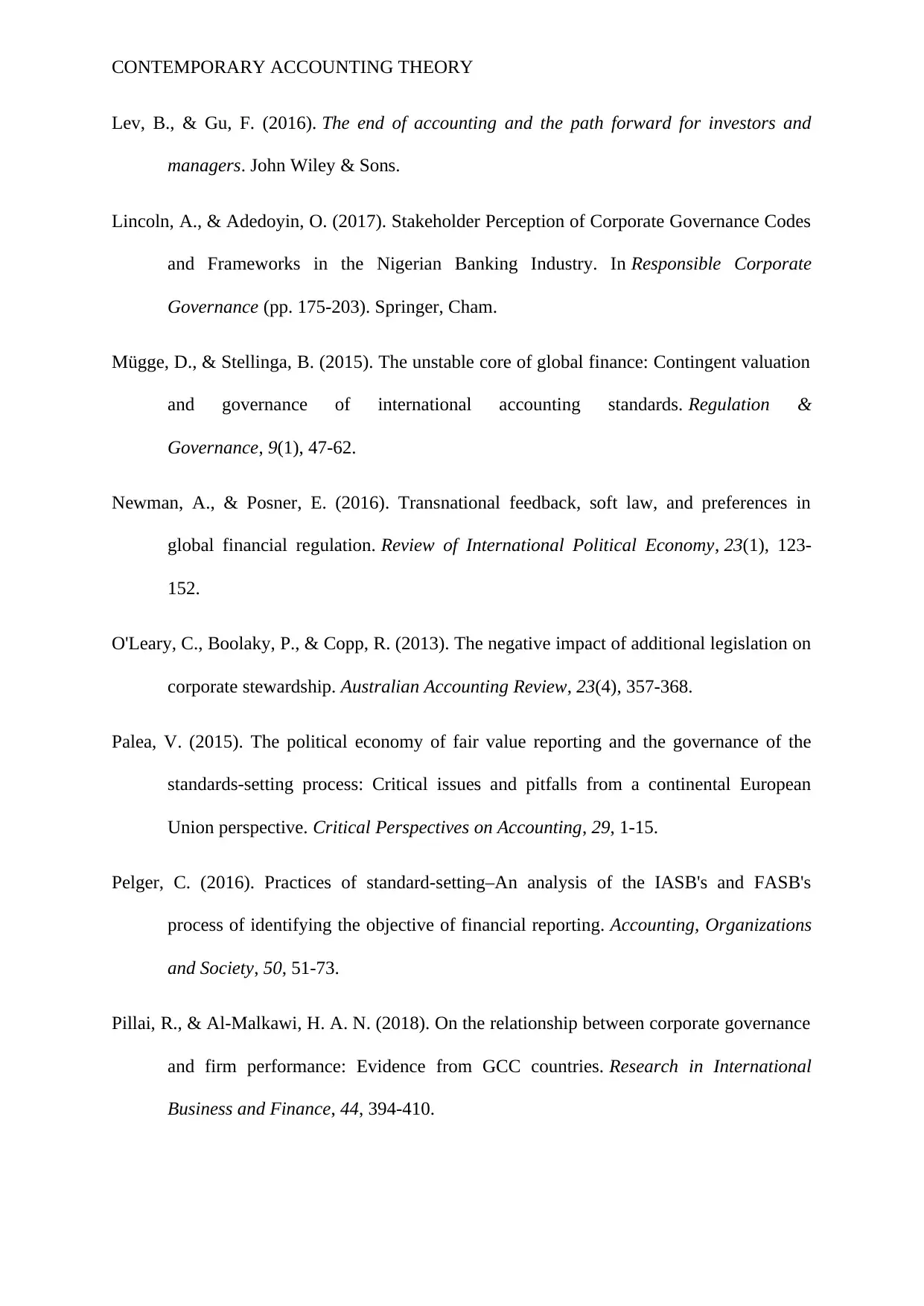
CONTEMPORARY ACCOUNTING THEORY
Lev, B., & Gu, F. (2016). The end of accounting and the path forward for investors and
managers. John Wiley & Sons.
Lincoln, A., & Adedoyin, O. (2017). Stakeholder Perception of Corporate Governance Codes
and Frameworks in the Nigerian Banking Industry. In Responsible Corporate
Governance (pp. 175-203). Springer, Cham.
Mügge, D., & Stellinga, B. (2015). The unstable core of global finance: Contingent valuation
and governance of international accounting standards. Regulation &
Governance, 9(1), 47-62.
Newman, A., & Posner, E. (2016). Transnational feedback, soft law, and preferences in
global financial regulation. Review of International Political Economy, 23(1), 123-
152.
O'Leary, C., Boolaky, P., & Copp, R. (2013). The negative impact of additional legislation on
corporate stewardship. Australian Accounting Review, 23(4), 357-368.
Palea, V. (2015). The political economy of fair value reporting and the governance of the
standards-setting process: Critical issues and pitfalls from a continental European
Union perspective. Critical Perspectives on Accounting, 29, 1-15.
Pelger, C. (2016). Practices of standard-setting–An analysis of the IASB's and FASB's
process of identifying the objective of financial reporting. Accounting, Organizations
and Society, 50, 51-73.
Pillai, R., & Al-Malkawi, H. A. N. (2018). On the relationship between corporate governance
and firm performance: Evidence from GCC countries. Research in International
Business and Finance, 44, 394-410.
Lev, B., & Gu, F. (2016). The end of accounting and the path forward for investors and
managers. John Wiley & Sons.
Lincoln, A., & Adedoyin, O. (2017). Stakeholder Perception of Corporate Governance Codes
and Frameworks in the Nigerian Banking Industry. In Responsible Corporate
Governance (pp. 175-203). Springer, Cham.
Mügge, D., & Stellinga, B. (2015). The unstable core of global finance: Contingent valuation
and governance of international accounting standards. Regulation &
Governance, 9(1), 47-62.
Newman, A., & Posner, E. (2016). Transnational feedback, soft law, and preferences in
global financial regulation. Review of International Political Economy, 23(1), 123-
152.
O'Leary, C., Boolaky, P., & Copp, R. (2013). The negative impact of additional legislation on
corporate stewardship. Australian Accounting Review, 23(4), 357-368.
Palea, V. (2015). The political economy of fair value reporting and the governance of the
standards-setting process: Critical issues and pitfalls from a continental European
Union perspective. Critical Perspectives on Accounting, 29, 1-15.
Pelger, C. (2016). Practices of standard-setting–An analysis of the IASB's and FASB's
process of identifying the objective of financial reporting. Accounting, Organizations
and Society, 50, 51-73.
Pillai, R., & Al-Malkawi, H. A. N. (2018). On the relationship between corporate governance
and firm performance: Evidence from GCC countries. Research in International
Business and Finance, 44, 394-410.
⊘ This is a preview!⊘
Do you want full access?
Subscribe today to unlock all pages.

Trusted by 1+ million students worldwide
1 out of 13
Related Documents
Your All-in-One AI-Powered Toolkit for Academic Success.
+13062052269
info@desklib.com
Available 24*7 on WhatsApp / Email
![[object Object]](/_next/static/media/star-bottom.7253800d.svg)
Unlock your academic potential
Copyright © 2020–2026 A2Z Services. All Rights Reserved. Developed and managed by ZUCOL.




